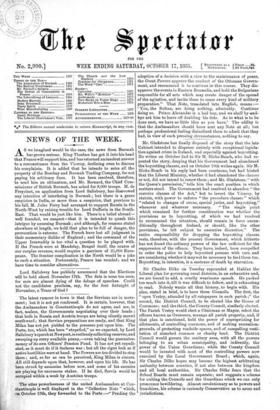Mr. Gladstone has finally disposed of the story that the
late Cabinet intended to dispense entirely with exceptional legisla- tion against crime in Ireland, and especially against boycotting. He writes on October 2nd to Sir M. Hicks-Beach, who had re- peated the story, denying that his Government had abandoned the boycotting clauses, and on October 10th writes again. Sir N. Hicks-Beach in his reply had been courteous, but had hinted that the Liberal Ministry, whether it had abandoned the clauses or not, did not intend to renew them ; and Mr. Gladstone," with the Queen's permission," tells him the exact position in which matters stood. The Government had resolved to abandon "the coercive clauses of the Act," but to invest the Viceroy, by statute, with power to enforce "the procedure clauses" which "related to changes of venue, special juries, and boycotting," whenever and wherever necessary. "The single point which remained for further consideration was whether the provisions as to boycotting, of which we had resolved to recommend the retention, should remain in force uncon- ditionally throughout Ireland, or should, like the other provisions, be left subject to executive discretion." The entire responsibility for dropping the boycotting clauses rests, therefore, with the present Government, which hitherto has not found the ordinary powers of the law sufficient for the suppression of the offence. They have, indeed, been compelled to order the police to help boycotted persons with cars, and are considering whether it may not be necessary to feed them too. Boycotting, in intention, is a sentence of death by starvation.


































